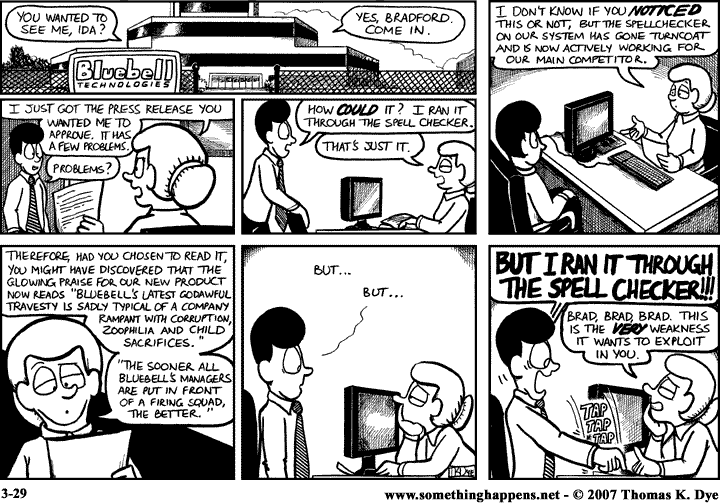This Is The Very Weakness
Fear the prophecies of Socrates and Thomas K. Dye.
It was a lot of work to find this webcomic I half-remembered.
Something Happens was an obscure1, gag-a-day webcomic with a deliberately generic title. Ryan North’s ohnorobot, which provides searchable transcripts of webcomics, didn’t have this one—in fact, the text of this comic doesn’t appear in any page indexed by Google. So hunting it down meant searching for old lists of surreal webcomics and clicking through to every one that looked familiar. Even when I got to Something Happens, it didn’t have an index or anything; I had to click through the archives one by one in chronological order.
In contrast, finding the Socratic dialogue that warns that the written word will rot your brain was very easy. Admittedly, it took a lot of work, over thousands of years, to get it to me. I especially feel for the monks and scribes who had to painstakingly copy a text arguing that text is useless. But my leg of the relay race was about 5 seconds long. Here’s an excerpt:
Socrates. There’s this old legend. I don’t know if ancient people actually believed it, but if there’s truth in it, who cares what they thought?
Phaedrus. Obviously that’s a rhetorical question. Please go on.
Soc. In the Egyptian city of Naucratis, there was this famous god Thoth. He’d invented a lot, such as math and games of chance, but his greatest invention was writing. He was excited to show it to the pharaoh. “This,” he said, “will make the Egyptians wiser and give them better memories. It’s like an intelligence-boosting drug.”The pharaoh replied: “Ingenious, Thoth! But the inventor of something isn’t always the best judge of its usefulness. In this case, you’re acting like a proud parent who can’t see his child’s flaws. This invention will actually make people’s memories worse, because they’ll start using writing instead of their own minds. People who learn from writing won’t have the truth, just the appearance of it. They will seem to be omniscient and in reality they will know nothing; it’ll be annoying.”
Phaedr. Yes, Socrates, it’s very easy to invent an ancient Egyptian myth that supports whatever point you’re trying to make.
And yet I somehow feel that people are often more impressed when I quote Socrates than Something Happens. Why?
Saying “Socrates is higher-status” is just begging the question. Why is it higher-status? It’s not a human universal. I’m sure there are schoolchildren who are contemptuous of people who know Socrates and respectful of people who always know the right meme to use.
I think the basic problem is that our intuition about the relative difficulty of things is always a little out-of-date. It wasn’t that long ago when quoting Socrates meant you had a Classical Education, which was very demanding and time-consuming. You’d probably had to hand-translate it from a dead language. And it was only, like, a year or two ago when Socrates was harder to understand than an “old” webcomic. There’s not always an accessible translation—even modern translators sometimes use archaic language because that’s what a translation is supposed to look like, right?
For that matter, I rewrote that dialogue just now, using an old translation as my source. More work, but the result is that it now looks less Classical and more like I might’ve made the whole thing up, lowering its status a bit. (Unlike an LLM, I have the concept of true and false, so I promise I’m giving an honest account of what Benjamin Jowett wrote Plato wrote Socrates said the pharaoh said.)
Okay, there. Have I demonstrated enough effort that I’m now allowed to briefly preach? Good.
It’s all well and good to discourage people from creating “AI slop”—writing where the last editorial pass, if not the whole thing, wasn’t by a person. But we need to combat it on the demand side too, not just the supply-side. We shouldn’t be impressed by polished, professional prose anymore. If we take something less seriously when it has a few typos or informal phrasing, all we’re doing is punishing people for not using a ghost-in-the-machine-writer. The true proof-of-work is having something to say.
Or, as Socrates put it, “Pay attention to the people who actually know things, not the people who write stylish prose full of half-remembered quotations.”
Wait. Shit. I take it back. Forget I wrote anything.
Bonus: Unreasonably Difficult Research
Vladimir Levenshtein, whose name shows up in error-correction algorithms everywhere, was the student in charge of Moscow University’s participation in a global socialist youth conference. This was just about the only information I could find about him from before the Berlin Wall fell, and it took buying an old piece of Soviet propaganda on eBay and cross-checking it with declassified CIA documents, so even if you don’t read the article I NEED YOU TO KNOW THIS.
Frank J. Primrose, the plaintiff against Western Union in a Supreme Court case about telegraph error correction, died nineteen years later when his taxi crashed into a telegraph pole.
Catherine Gore, a once-famous English novelist, got her last name by marrying the once-infamous Lieutenant Gore, a soldier accused of firing into a crowd protesting Queen Caroline’s funeral.
The joke about the Jews and the bicycle riders was originally about making fun of people who hated both demographics, back when bicycles were a new-fangled contraption.
The artist is better known as a prominent furry and author of Newshounds.



